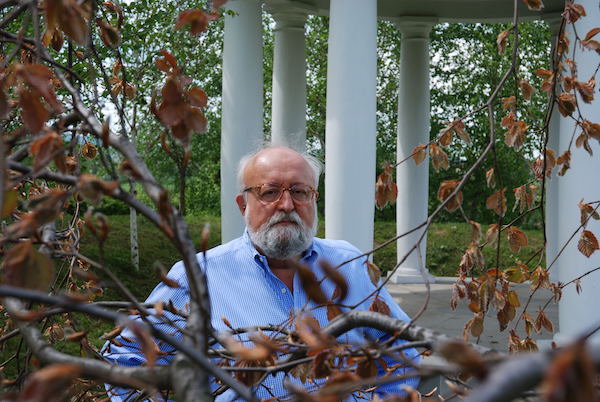Krzysztof Penderecki 1933-2020

Krzysztof Penderecki, one of the most prominent compositional voices in 20th century music, died Sunday, March 29, at the age of 86. The Ludwig van Beethoven Association, founded by the Polish composer’s wife, Elzbieta, noted that his death came after a long illness.
Born in 1933, Penderecki began studying the violin after World War II, in 1946. In the 1950s, he moved on to Jagiellonian University in Kraków, then to the Academy of Music, where he completed his violin studies and began studying composition first under Artur Malawski and then Stanislaw Wiechowicz. After graduating, Penderecki began teaching at the Academy in 1958.
Penderecki’s Threnody for the Victims of Hiroshima (1960) launched his career and immediately projected his work into the public sphere. Using graphic notation and orchestrated for string orchestra, the intense, abrading experience of the music melded experimentalism with direct communication and expression.
That last quality was a constant in the composer’s career. While the eerie, disturbing, and gripping sound of works like the Threnody, Polymorphia, and Fluorescences made them ideal for horror movies and other weird stories, Penderecki’s work went well beyond mere effects. While teaching at Yale in the 1970s, his work moved, almost literally half-step by half-step, into tonality. Limited by the totalitarian ideology of Poland’s communist government, he found early liberation in the avant-garde; in the West he came to feel that unfettered experimentalism, the constant destruction of form, was a dead end.
Rather than a break from his past, Penderecki saw this as a natural development of his artistic needs, which for him were always founded in the emotional and intellectual expressive possibilities of music—the primal scream of Threnody adapted to language that was subtler, more complex, and ultimately more meaningful.
One of his most important works, publicly and privately, was his St. Luke Passion from the mid-1960s. Though using experimental language, it was liturgical in more than just the formal sense, held together through traditional structures, and showed Penderecki as a devout artist. He went on to compose many religious works, including a Magnificat, Deus Irae, Te Deum, and the Polish Requiem, a traditional and exquisitely beautiful work.
Violinist Anne-Sophie Mutter was one of his finest interpreters—the two collaborated on his Violin Concerto No. 2, Metamorphosen, recorded in 1997 and later rereleased on a 2018 Deutsche Gramaphon album Hommage à Penderecki, on which the violinist also plays La Follia per violino solo, the Sonata No. 2, and other works.
As with his contemporary György Ligeti, Penderecki enjoyed notable popular success and recognition via movie soundtracks. His music was used by director Stanley Kubrick in The Shining, and The Exorcist soundtrack featured his String Quartet and Kanon for Orchestra and Tape. Other movies that used excerpts from Penderecki’s catalogue include Wild at Heart, Fearless, and Children of Men, and the 2017 incarnation of David Lynch’s TV series, Twin Peaks.
Though predominantly known for orchestral works, the aforementioned early pieces, eight symphonies, and music for chorus and orchestra, Penderecki’s chamber music may represent his peak. Along with the two violin sonatas, the String Quartet, and a String Trio, he wrote a Sextet that seemed to launch equally from the colors of Kurt Weill and the playful formalism of Hindemith’s Kammermusik. His Clarinet Quartet is darkly beautiful.
Across the decades of creative work, Penderecki’s voice remained the same. He preferred a minor-key sensibility, his music outlined tragic events and emotions while drawing force and determination from the same.
Perhaps most significant was his Lacrimosa, commissioned by the Solidarity movement in 1980 for the unveiling of a statue commemorating those killed in anti-government demonstrations at the Gdánsk shipyards. The deeply felt music would become the heart of his gorgeous Polish Requiem.
In addition to his significant and distinctive legacy on Earth, Penderecki’s name will also endure in the heavens: in 1991, an asteroid in the main Asteroid Belt was christened 21059 Penderecki.


